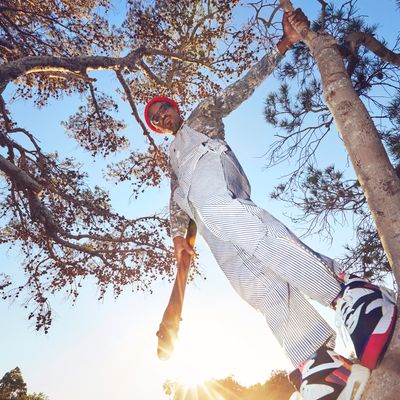
Since the 1993 release of OutKast’s debut single, “Player’s Ball,” André 3000 has cultivated a powerful distaste for easy wins. Resistance was always core to the Georgia duo, and their wide web of interests yielded dense, unpredictable American pop music, cementing his and Big Boi’s reputation as one of the most gifted songwriting teams in any musical tradition. André in particular seemed to delight in scrambling normies’ circuits. “It’s the people who take whatever music they doing so far to the left of what was going on,” he gushed while naming influences during a 2000 Rolling Stone profile. “Put on any album from goddamned 1966 and put on a Sly Stone album — it sounds very different. P-Funk from any time sounds different. Those are the people that inspired us to blow niggas’ minds.” Across later OutKast works, André seemed driven by an appetite for this interdisciplinary respect, as a gritty meta-commentary on fame, rap clichés, and industry politics guiding “Ova da Wudz” and “Return of the ‘G’” took a back seat to the restless experimentation in The Love Below.
As Outkast’s steady stream of groundbreaking releases slowed to a trickle in the mid-aughts, fans began pining for an André solo album. You took whatever you could get in those years, poring over the zany children’s songs populating the soundtrack from his Class of 3000 cartoon. His rhymes, meanwhile, relayed dwindling interest in the very act of rapping in front of audiences. “I hated all the attention so I ran from it / Fuck it if we did, but I hope we ain’t lose no fans from it,” he admitted in T.I.’s 2012 single “Sorry.” “I’ve stumbled and lived every word,” the jarring kicker to his “Solo (Reprise)” from Frank Ocean’s 2016 album, Blonde, huffs, “was I working just way too hard?” (He must have understood the absurdity of the question, being one of the catalysts in the chain reaction of Black male creativity that nudged us from the pointed callousness of 50 Cent to the public introspection of Drake. Do we grant Ye the space to hang the sharp left he pulled on 808s & Heartbreak without André riskily sidelining the raps on The Love Below? Would Young Thug get to talk shit and wear dresses without another notable ATL dandy giving uninitiated spectators a frame of reference?) To follow André 3000 was to love the player while resenting the game, a reality he addressed on Devin the Dude’s 2007 gem “What a Job”: “We work nights, we some vampires / Niggas gather ’round the beat like a campfire / Singing folk songs, but not no ‘Kumbaya My Lord’ / You download it for free, we get charged back for it.”
So it shouldn’t be an earth-shattering surprise that André’s first major post-OutKast enterprise, the ambient jazz album New Blue Sun, would trade rhymes and 808 drums for something looser and lusher. Like OutKast’s success in deprogramming men’s style during the homophobic aughts, Sun is low-key punk as fuck, a bold and pure creative gesture that centers André’s newfound love for the flute. It manages to upset and confound while fitting into a deep and vital Afrofuturist tradition not nearly as removed from the sound and spirit of Dungeon Family classics as the most annoyed responses to it have suggested. The mounting atmospheric tension in its instructively titled opener, “I swear, I Really Wanted to Make a ‘Rap’ Album But This Is Literally the Way the Wind Blew Me This Time,” with its wave of mournful keys and delicate percussion, calls back to the milky ambience that announces ATLiens’ “You May Die (Intro)” and Aquemini’s “Hold On, Be Strong.” “Ninety Three ’Til Infinity and Beyoncé” delivers the precise brand of airy, contemplative riff Atlanta poet Big Rube shines on. (You could imagine a being from the video for The Love Below’s “Prototype” making this extraterrestrial, ruminative noise.)
New Blue Sun is a produced collection of long improvisations documenting the moment an incredible groove shows face rather than the concise compositions rappers like to build around them. André has suspected the flute’s subtle resemblance to the human voice first attracted him to the instrument, and it’s kismet for a rapper to find himself swept up in a second musical venture involving breath control. It doesn’t feel labored like the left-handed guitar drills he put himself through to play Jimi Hendrix in 2013’s Jimi: All Is by My Side, not long after the long, skronky solo in Rick Ross’s “Sixteen” elicited guffaws. So New Blue Sun’s second surprise is the sparseness and the digital character of the playing. Tiptoeing into the sound bath prepared for him in “‘Rap’ Album,” André tuts on an uncanny oboe, effecting a timbre resting somewhere between the pomp of a symphony orchestra and the silliness of the incidental music in cartoons. His arsenal of flutes includes digital wind instruments, and he has admitted that there are points in the recordings where he’s feeling out patches. Are the dark, understated notes in “The Slang Word ‘P(*)ssy’ Rolls Off the Tongue With Far Better Ease Than the Proper Word Vagina. Do You Agree?” deliberately or accidentally approximating the exploratory keyboard noodles you’d expect to encounter in Roy Ayers and Herbie Hancock works of the mid-’70s? On “That Night in Hawaii When I Turned Into a Panther and Started Making These Low Register Purring Tones That I Couldn’t Control … Sh¥t Was Wild” — a meditation on an ayahuasca trip where, again, the thing in the song title really happened — the winding contrabass exhalations mimic the low voice of bamboo nose flutes of the Pacific Islands.
New Blue Sun largely succeeds as ambient music because it soothes and entices on a tactile level while lending itself to deeper consideration of the history and musicology informing it. It’s engaging when it is allowed to float into a room, occupying space without overpowering it, like spritzes from a time-released air freshener, and also when it’s turned up to parse what’s being played to the extent that this is possible. Throughout the album, the woodwind instrument carrying a song (or stalking its margins, depending on the mood of the flutist) is flanked by drummer and utility player Carlos Niño’s expansive palette of percussive textures; ephemeral guitar and synthesizer accompaniment from Nate Mercereau and Surya Botofasina; breathy vocals from Mia Doi Todd; and other sedate but impactful contributions from musicians in André and Niño’s orbit. New Blue Sun taps a colorful succession of ’70s and ’80s antecedents like Laraaji’s explorations on Casiotone and zither, Stevie Wonder’s songs for plants, and Jon Hassell’s anthropological endeavors. But it still feels at home in the decade where players like Sampha and Nala Sinephro are blending jazz and soul aesthetics and merging electronic and acoustic sounds.
It’s an incredible achievement taking the heat off André’s chops as a soloist by letting him drift where a more traditional jazz bandleader would have to drive. But sometimes New Blue Sun takes too long to get to shore. It is impressive that the swelling, psychedelic climaxes of “Ants to You, Gods to Who?” and the shimmering “BuyPoloDisorder’s Daughter Wears a 3000® Button Down Embroidered” happened spontaneously, that this album offers a succession of musical knots methodically and satisfyingly untied, and the best bits aim for the reassurance and rejuvenation of a massage and nail it. The conciseness of “Beyoncé,” a reprieve for listeners alienated by the absence of four-minute songs and melodies that repeat at a somewhat fixed tempo everywhere else on the album, raise the question of what this thing might have sounded like if these performances were reined in a little, or or shaped more purposefully the way Four Tet curated Madlib’s Sound Ancestors. It must’ve felt more important to relay a bit of presence, to open a window on the chemistry igniting in this group. The meandering “Panther” and “Ghandi, Dalai Lama, Your Lord & Savior J.C. / Bundy, Jeffrey Dahmer, and John Wayne Gacy” grate; it also feels like the informal nature of the sessions is the only reason the album exists.
There’s a certain closure in making it to the end of this 88-minute album not once having heard the voice of the artist. There are people who have waited 20 years — since Speakerboxx/The Love Below landed with only three rap performances from Stacks — for an orderly presentation of the rhyme skills that made “Ms. Jackson” a household name. New Blue Sun might not be their cup of tea, but it sits on the necessary axis of inner peace and musical challenge needed to get André 3000 to commit to recording and sharing new work, so it’s a net win. (Now, he has to perform.) This isn’t the esteemed return to form those who bristled at the ubiquity of “Hey Ya!” held out hope for. The promise of new scriptures from the Southern-mystic rhyme technician who spit “the hardest shit since MC Ren” dances on the horizon while we poke around on a different planet in the Dungeon Family galaxy. And if he never gets around to making the album people want him to, he’ll have ambient-pilled untold masses of hip-hop heads, and maybe the most eventful bits of this record will echo across future rap songs the way “SpottieOttieDopaliscious” took a proggy Genesis riff and transformed it into a funk-rap classic. Your heroes don’t need to travel ahead of you, leaving detailed instructions to navigate every situation you’ll eventually encounter. Their only job is to provide the inspiration you need to be more purely and courageously you.





